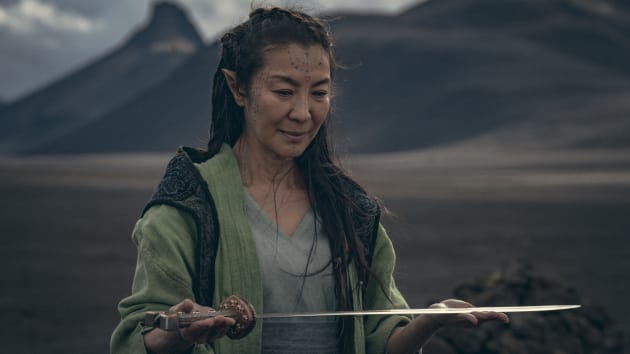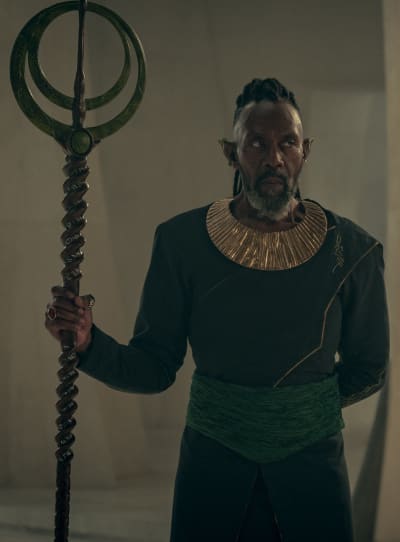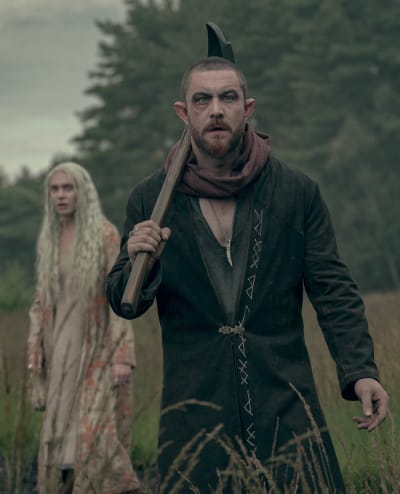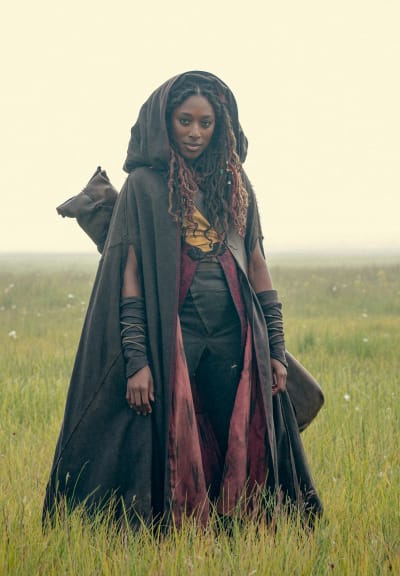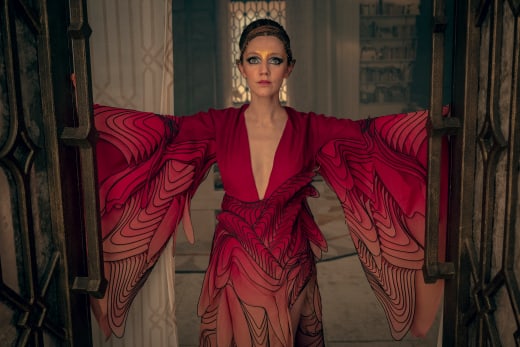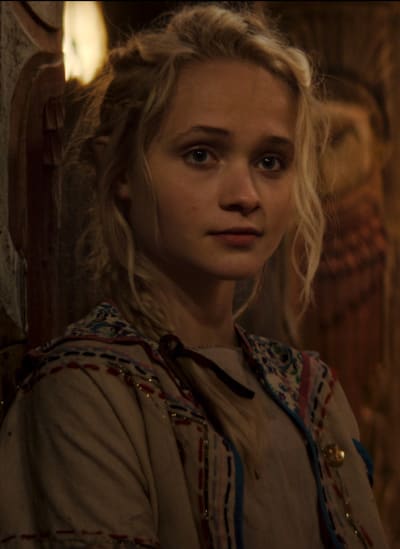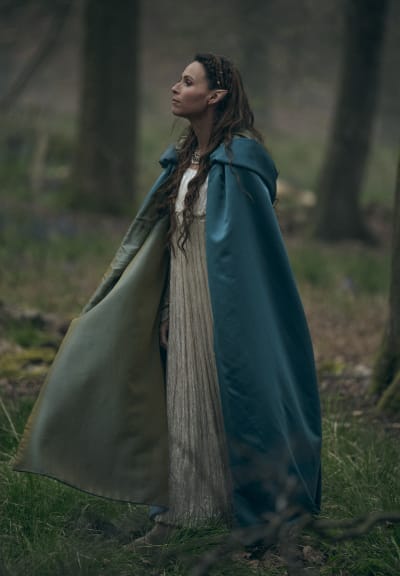Three battles come to their respective climaxes on The Witcher: Blood Origin Season 1 Episode 4.
There is a mage battle, a monster battle, and… well, Merwyn.
And while the good guys win, nothing is ever simple when the stakes are this high. Seanchai leaves Jaskier with directions to spread the Song of the Seven. How this will affect the elves of his world, only time (and The Witcher Season 3) will tell.
The most obvious and dangerous antagonist in this multi-faceted conflict is unquestionably Chief Sage Balor.
His obsession with opening gateways using the monoliths has stripped the land of its vitality. His impulsive purging (i.e., killing) of uncooperative mages means crops are failing and water has dried up. The people suffer.
Furthermore, the monoliths are also tearing the fabric of the universe. Zacaré and Syndril’s mission is to destroy the master monolith in the Xin’trean palace.
Of course, their timing sucks, and Balor strolls back into our dimension just before they reach the monolith, now the master of god-like powers of Chaos.
Their battle is the typical wizard duel, Syndril’s sparks warring with Balor’s fireballs. Ironically, Zacaré and Syndril might not have been able to destroy the monolith on their own.
With a final touch, the great mage shattered his greatest creation, not realizing the energy released would shatter space and time itself. The fragile veils between worlds had been ripped apart. Planes of existence began to cross. Skies warred with skies. Night fed upon day. Multiple worlds crossed through each other, scattering species like seeds as they merged. This was the Conjunction of the Spheres. Every living thing fell silent.
Seanchai
With Balor in play, Syndril’s idea to combine his own magic with Balor’s to shatter the monolith proves successful, although it doesn’t save the world from the Conjunction of the Spheres.
So, we now know that the Conjunction that brought monsters and man to The Continent was the only alternative to the total annihilation of the world by the power of the monoliths.
Before the transformed Fjall can fight Balor’s Chaos beast, he first faces his past as Merwyn asks him to return to her side despite her complicity in assassinating her brother and her active role in killing his entire family.
I knew everyone that I loved would die, and I said yes. Without a second breath. I was going to be a footnote in someone else’s story. I was a fertile thing to be traded. I was unseen, Fjall!
Merwyn
Fjall fights off his inner monster long enough to tell her off.
His battle with the beast is almost as epic.
But once the Chaos beast within him is out, there’s no reversing the transformation.
Poor Uthrok. He was a very entertaining addition to the ensemble.
I guess the Lark owes him a song.
Uthrok: If I fall, you owe me a song, and I want both me stones in it.
Éile: Uthrok Mighty Cock. He who had two enormous balls that slew an empire!
Uthrok: Hark that Lark!
Speaking of Éile, her confrontation with Merwyn is as much symbolic as it is physical.
It’s quite the elegant resolution to the conflict that began with the coup that murdered the three Continental monarchs and their royal protectors.
Éile has ostensibly been on a mission ever since to kill Merwyn and her supporters in retribution for the murder of the Raven Clan.
But along the way, Éile realizes that the fight isn’t between her and Merwyn; it’s between the lowborns and those in power.
Merwyn: Everything I have done has been for elfkind, and I will not apologize for that, Lark.
Éile: You’ve no idea what elfkind even is. You’re just another spoiled princess.
Merwyn: I am Empress!
Éile: You are a child given the reins of a warhorse. You don’t speak for elfkind.
Merwyn: What, and you do?
Éile: They speak for themselves now.
There are similarities between Éile and Merwyn, as the Empress points out at the outset of their encounter. They’ve both taken paths other than the one planned for them.
They’ve both loved Fjall.
But if the writers were looking for us to feel sympathy for Merwyn’s plight, that emotional load didn’t land.
And although Uthrok was no prophet, he’d seen enough uprisings to know the lowborns would never be able to keep control over their own lives.
You’re a lovely looking uprising. Enjoy your freedom while it lasts. Oh, by the way, they have peaches in the kitchen.
Uthrok
Éile’s final message to Merwyn is a gift of choice.
It’s the choice that every dictator is offered at the end of their regime. Fight on, or give up.
You want to control your own story. I’ve given you a choice. Leave the blade as it is, and a physic might find you. Save you. You’ll live long enough to watch your world crumble around you. Face your wrongs. Or pull it out and bleed to death a coward. No one will know. No one but you.
Éile
Merwyn’s decision is rather bizarre. She hangs on long enough to return to her throne and don her crown again.
Then just as the lowborns storm the palace, she pulls out her blade. Dying as Empress for an audience.
As an audience, we know that in twelve hundred years, elfkind will be hounded and persecuted by humans as elves did to dwarves.
There’s a cycle to power shifts, and in the time of Geralt and Yennefer and Ciri, monster numbers will have dwindled by humans will have exploded in population and ambition.
It all begins here with the deaths of Balor and Syndril, Merwyn and Fjall.
This is the time of Ithlinne, who will one day prophesy Ciri’s path and the world’s end.
This is the time of The Lark, whose songs will inspire and whose blood will carry salvation.
These events will give rise to the Wild Hunt that Eredin will lead and Avallac’h will evade.
The Witcher: Blood Origin gives a glimpse into the past to contextualize the events that would only postpone the end of days for The Continent.
The question remains how the Song of the Seven will affect the elves who listen to The Sandpiper’s words. Will it be enough to stem the oncoming dangers?
To put the responsibility for the world’s survival on the shoulders of Jaskier and his songs is an enormous burden.
Who is the last of the Lark and Fjall’s line?
Did Zacaré and Brother Death live long lives together? Did Meldof find a glorious battle in which to die and join Gwen?
What happens to Scían?!?
The Witcher: Blood Origin may have served its purpose in seeding future main plotlines in The Witcher, but it does a disservice in introducing some characters that we are not ready to let go to the mists of history.
Diana Keng is a staff writer for TV Fanatic. Follow her on Twitter.
